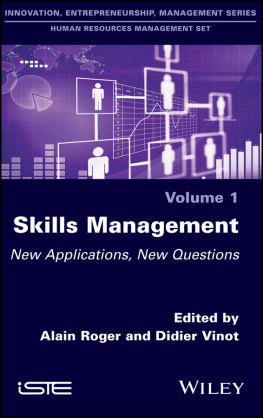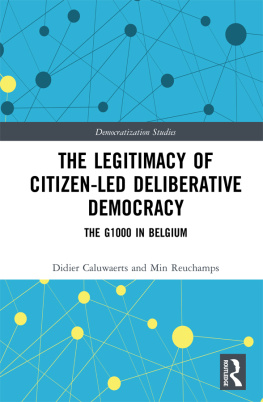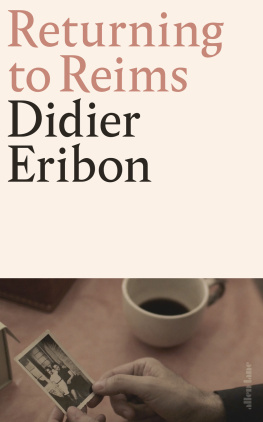Vinot Didier - Skills Management: New Applications, New Questions
Here you can read online Vinot Didier - Skills Management: New Applications, New Questions full text of the book (entire story) in english for free. Download pdf and epub, get meaning, cover and reviews about this ebook. year: 2019, publisher: John Wiley & Sons, Incorporated, genre: Romance novel. Description of the work, (preface) as well as reviews are available. Best literature library LitArk.com created for fans of good reading and offers a wide selection of genres:
Romance novel
Science fiction
Adventure
Detective
Science
History
Home and family
Prose
Art
Politics
Computer
Non-fiction
Religion
Business
Children
Humor
Choose a favorite category and find really read worthwhile books. Enjoy immersion in the world of imagination, feel the emotions of the characters or learn something new for yourself, make an fascinating discovery.
- Book:Skills Management: New Applications, New Questions
- Author:
- Publisher:John Wiley & Sons, Incorporated
- Genre:
- Year:2019
- Rating:4 / 5
- Favourites:Add to favourites
- Your mark:
- 80
- 1
- 2
- 3
- 4
- 5
Skills Management: New Applications, New Questions: summary, description and annotation
We offer to read an annotation, description, summary or preface (depends on what the author of the book "Skills Management: New Applications, New Questions" wrote himself). If you haven't found the necessary information about the book — write in the comments, we will try to find it.
Skills Management: New Applications, New Questions — read online for free the complete book (whole text) full work
Below is the text of the book, divided by pages. System saving the place of the last page read, allows you to conveniently read the book "Skills Management: New Applications, New Questions" online for free, without having to search again every time where you left off. Put a bookmark, and you can go to the page where you finished reading at any time.
Font size:
Interval:
Bookmark:
Manel DARDOURI
Universit de Lyon
France
Christophe EVERAERE
Jean Moulin University
Lyon
France
Stphane FOLIARD
Institut Universitaire de
Technologie
Roanne
France
Sylvaine MERCURI CHAPUIS
ESDES
Lyon Catholic University
France
Hlne MONIER
Jean Moulin University
Lyon
France
Ewan OIRY
ESG-UQAM
Montreal
Canada
Alain ROGER
Jean Moulin University
Lyon
France
Lynda SAOUDI
Institut Universitaire de
Technologie
Roanne
France
Marc VALAX
Jean Moulin University
Lyon
France
Didier VINOT
Jean Moulin University
Lyon
France

Skills Development at the Heart of the Mentoring Relationship
Given the natural character of change, the development and transfer of skills is proving to be a recurring challenge for organizations. Maintaining and controlling these resources is a competitive advantage and contributes to ensuring flexibility in order to adapt to market developments (Cazal & Dietrich, 2003). Individuals support and the enhancement of their skills become, consequently, a crucial need. Our research is in line with this framework of ideas. This chapter focuses on the issues of support practices in particular mentoring in the development and dissemination of skills.
Mentoring is classically defined as: A relationship based on mutual respect between an experienced, recognized and credible person (mentor) and a younger person (mentee) (Guay, 2002). It allows the mentees to consolidate their professional identity and to benefit from support in order to develop their career. This assistance and learning relationship is at the heart of our question. In this sense, the main objective of our research is to study mentoring through the prism of competence. A literature review will allow us to better apprehend competence, beyond its polysemic notion. The idea is to establish the distinction between the three levels of analysis (individual, collective and organizational) that are linked to it.
Then, we will present the characteristics and challenges related to mentoring practice that constitutes an opportunity for the development and transfer of skills (Fredy-Planchot, 2007). The issue which feeds our thinking is based on the following question: How does mentoring contribute to the development of individual skills and the emergence of collective skills within a company?
Several researchers have lent themselves to the exercise of identifying the notion of competence. The number of scientific writings on the subject leaves little hope to those who would like to advance other simpler formulations. Koebels census work (2006) reveals a numerical presentation: The catalogue of the Institut de linformation scientifique et technique (INIST) is part of the CNRS whose mission is to collect, process and disseminate the results of scientific research and lists, in 2002, 2726 articles containing the word competence in the title. On the basis of this observation, it should be noted that the plurality of definitions has inspired multiple changes in professional practices (development of competence standards, manpower planning, recruitment and personal assessment, identification of key skills and strategic management, etc.) (Coulet, 2016).
In France, this concept has been the subject of various negotiated agreements, such as manpower planning (2005), senior measures (2010), generation contracts (2013), employment agreements (2014), jobs management, career paths and mix of trades (2015) and so on. In this sense, it would be pointless to go into criticism of the definitions identified in the literature. We will endeavor to shed light on the context of emergence of the notion of competence our wish being, at first, to establish a state of discourse places and of practices using this concept and second, to identify the challenges and the types of skills observed within businesses.
Let us recall first of all that the etymological origin of the term, competence derives from the Latin word competens, which means that goes with. Thus perceived, competence basically implies a dynamic interaction process (White, 1959). However, the variety of definitions in the literature reveals that it is a term with different facets, which means only what the author wants to say (Zemke, 1982; Le Deist & Winterton, 2005; Murray & Donegan, 2003; Wright et al., 2001).
A semantic identification of the competence concept stresses that this term has been used in varied disciplinary fields: sociology, psychology, education and training sciences, ergonomics as well as management sciences (Murray, 2003). The first literature review around this subject designates the word competence as a sponge-word, which absorbs numerous meanings: As the sponge absorbs little by little the substances it comes across, the word competence is enriched by all the meaning attributed by those who use it (Gilbert & Parlier, 1992).
Other authors still highlight its protean aspect by stating that the plasticity of this term is an element of the social force that it constitutes and of the ideas that it conveys (Rop & Tanguy, 1994). The term is sometimes defined as a specific skill, but more often, mainly in sociology, as a set of skills owned by a person in a specific context. This being the case, it should be noted that the introduction of the notion of competence depends largely on national contexts, whether cultural, institutional, legal or economic, in which it is registered.
After presenting the normative definition of this concept, as it is suggested in the English dictionaries, we will present the definitions institutionally proposed by AFNOR, MEDEF and ROME (French operational directory of trades and jobs). Finally, we will refer to the scientific literature on the subject.
The first reference that we identify is that of normative dictionaries, which provide a global acceptance of the term competence. In this regard, Larousse proposes the following definition: In commercial and industrial business, competence is the set of knowledge, qualities, abilities, aptitudes which enable us to discuss, consult and decide on everything that concerns a profession (Larousse Commercial, 1930).
Petit Robert presents skills as follows: In-depth, recognized knowledge, which confers the right to judge or to make decisions in certain matters (Petit Robert).
These first definitions show that skills are similar to knowledge and implicitly depend on the context in which they develop. These meanings certainly clear remain very limited.
In the French context, Zarifian (2009) mentions that the first institutionally established definition of the word competence was proposed by the Mouvement des entreprises de France (MEDEF): Professional competence is a combination of knowledge, know-how, experience and behaviors, exercising in a specific context. It is expressed during its implementation in the professional situation from which it is valid. It is therefore up to the company to which it belongs to locate, evaluate, validate and evolve it. This definition has undoubtedly influenced the management of enterprises, which are embarked on what, at the time, was called skills logic, an expression replaced today by skills approach and supported by laws on vocational training, which assigns skills development as the major objective of training policies.
Font size:
Interval:
Bookmark:
Similar books «Skills Management: New Applications, New Questions»
Look at similar books to Skills Management: New Applications, New Questions. We have selected literature similar in name and meaning in the hope of providing readers with more options to find new, interesting, not yet read works.
Discussion, reviews of the book Skills Management: New Applications, New Questions and just readers' own opinions. Leave your comments, write what you think about the work, its meaning or the main characters. Specify what exactly you liked and what you didn't like, and why you think so.








